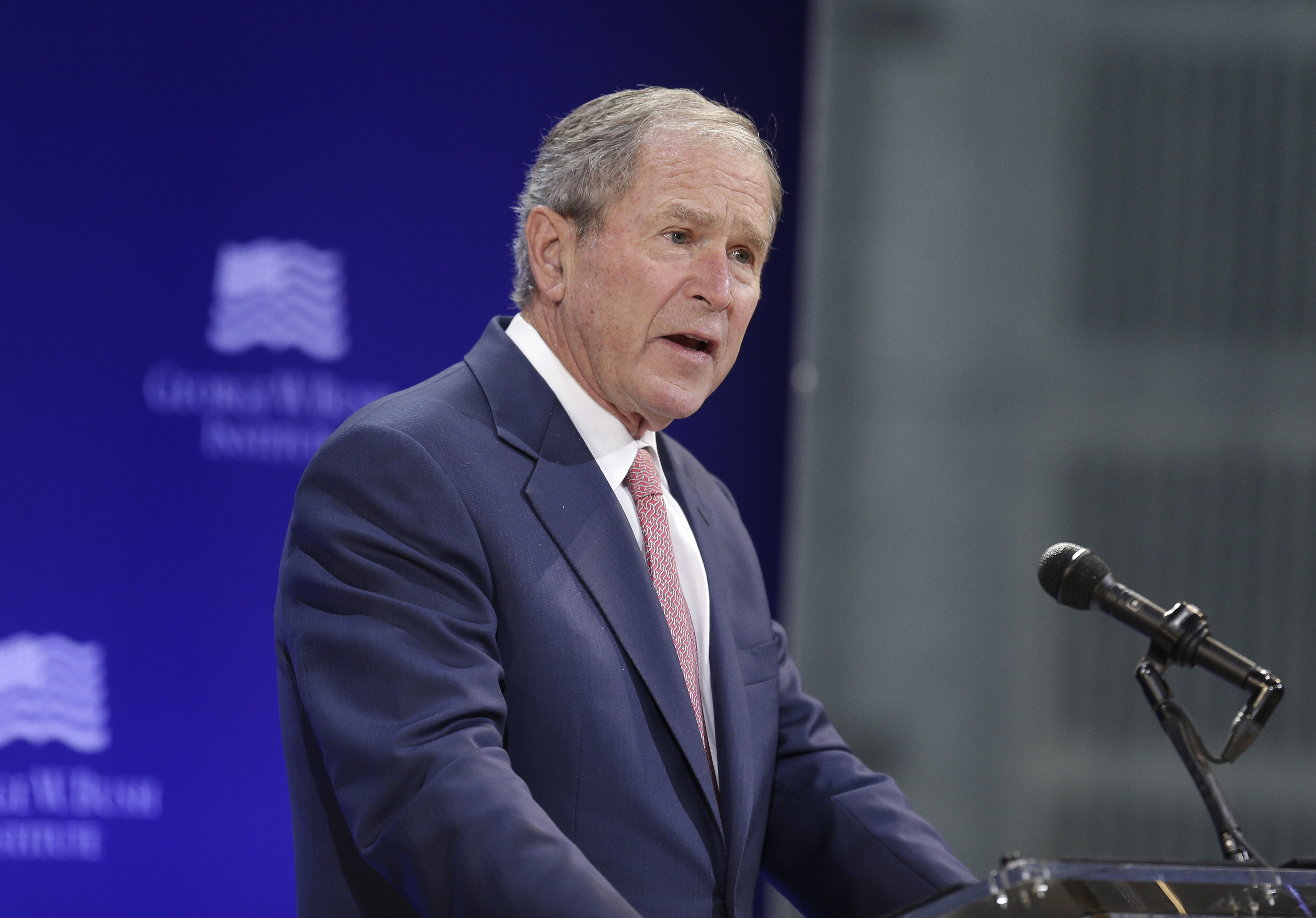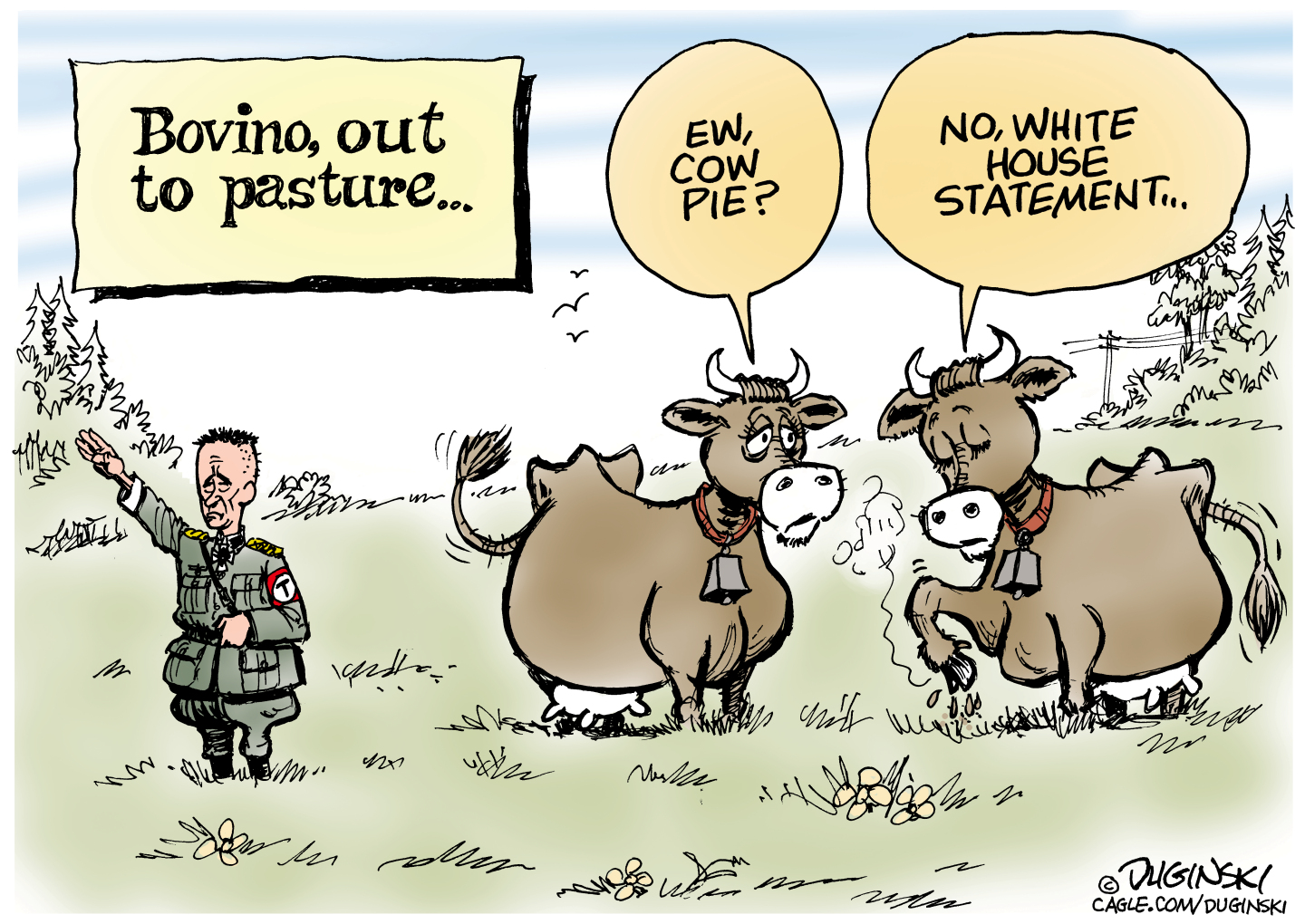The center-right's empty idealism
This is little more than wistful thinking and hopeless nostalgia


With raw civic sewage flowing freely from the Trump White House each and every day, it's no wonder that journalists and pundits from across the political spectrum responded with wistful nostalgia last week upon hearing clips from speeches by Sen. John McCain (R-Ariz.) and former President George W. Bush.
In Philadelphia to receive the 2017 Liberty Medal from the National Constitution Center on Oct. 16, McCain took several jabs at President Trump (without naming him) and defended the highly idealistic vision of the country that's largely rejected by the forces in the GOP that supported and enabled Trump's hostile takeover of the party in 2016.
At an event in New York three days later, Bush defended the same idealized construal of the country, its history, and its role in the world, while adding more specifics. For Bush, the United States stands for freedom and democracy, which are the "inborn hope of our humanity," and is called upon to defend them against their enemies abroad. Doing so involves supporting the liberal international order against tyrannical and totalitarian threats, as well as favoring free trade, the dynamism that results from relatively open immigration, and policies that empower the job-creating juggernaut of the private sector.
The Week
Escape your echo chamber. Get the facts behind the news, plus analysis from multiple perspectives.

Sign up for The Week's Free Newsletters
From our morning news briefing to a weekly Good News Newsletter, get the best of The Week delivered directly to your inbox.
From our morning news briefing to a weekly Good News Newsletter, get the best of The Week delivered directly to your inbox.
If it weren't for the Trump administration's promotion of a far more culturally populist and nationalist ideology, there would be nothing at all noteworthy about McCain and Bush's statements. On the contrary, they would be seen as expressions of the purest political boilerplate — a recitation of chapters and verses from the hymnal of American civil religion that one might have expected to hear from any president or presidential candidate from either party at any point since Ronald Reagan was elected (and maybe earlier). They stand out today, and move many of us a bit more than they once did, only because President Trump and many of his senior advisers don't speak this language and don't entirely share the moral and political vision it expresses.
It's precisely the familiarity of the language and political vision that should strike us as strange. McCain and Bush recited the same civic poetry we've heard for decades, the same poetry that lost out to Donald Trump in the 2016 GOP primaries. Yet here we are, nearly a year into the Trump administration, and two of the most prominent figures in the Republican establishment have decided to respond by saying … precisely the same thing yet again.
If insanity can be defined as doing the same thing over and over again while expecting different results, America's center-right has arguably gone a little mad.
It’s an ordinary form of madness — perhaps the most ordinary kind of all, rooted in denial. We sometimes see it in miniature in our own lives when we confront severe trauma or sudden loss. In politics, it's most common after a revolution, whether literal or figurative.
A free daily email with the biggest news stories of the day – and the best features from TheWeek.com
Trump's success in winning the Republican presidential nomination in 2016 was a figurative revolution, with the party's McCains and Bushes deposed or overthrown. In response, there's been resolve and resistance but precious little reflection on what these leading members of the ancien regime did to contribute to the rise of the revolutionaries.
A version of the same dynamic played out two generations ago among Cold War liberals in the aftermath of the 1960s. Taking a strong stand against the countercultural forces that took over the Democratic Party with the nomination of George McGovern in 1972, these more conservative liberals (the soon-to-be neoconservatives) pined for a return to the good old days of the 1950s. But they did so without pondering how and why the '60s followed and emerged in reaction to the '50s in the first place. Even if it had been possible to return to something like the moral order of the '50s, there is every reason to believe it would end in the same way — by evolving into something like the '60s all over again.
We can see the same myopia and wishful thinking on the center-right today. Back to Romney! Back to McCain! Back to Bush! Back to Reagan! But what would follow from such a return if not precisely the same eventual populist insurrection that has already overturned the old order? What should a successor to Reagan, Bush, McCain, and Romney do differently to prevent the same fate from unfolding? What policies or rhetoric should change?
It's impossible to know because no one on the center-right is saying. Which probably also means that no one is thinking — or is thinking too small. (The passing remarks in Bush's speech about helping citizens who are hurting harkens back to the "compassionate conservatism" that he ran on in 2000 and that has hardly proven to be enduringly popular with the Republican electorate.)
The center-right knows what it believes in, at least at the level of ideals, and it wants and expects the voters to approve of it. But the voters have made clear that they do not. The sensible response to this problem is not to keep stubbornly reaffirming those same rejected beliefs in the misplaced hope that the voters will suddenly come to their senses. It's to rethink those beliefs, transforming them into something that might have greater popular appeal — or else to retire from the arena, making room for new ideas and new champions.
Bush and McCain delivered a couple of nice speeches last week. But now it's time for them to go.
Damon Linker is a senior correspondent at TheWeek.com. He is also a former contributing editor at The New Republic and the author of The Theocons and The Religious Test.
-
 5 redundant cartoons about Greg Bovino's walking papers
5 redundant cartoons about Greg Bovino's walking papersCartoons Artists take on Bovino versus bovine, a new job description, and more
-
 31 political cartoons for January 2026
31 political cartoons for January 2026Cartoons Editorial cartoonists take on Donald Trump, ICE, the World Economic Forum in Davos, Greenland and more
-
 Political cartoons for January 31
Political cartoons for January 31Cartoons Saturday's political cartoons include congressional spin, Obamacare subsidies, and more
-
 The billionaires’ wealth tax: a catastrophe for California?
The billionaires’ wealth tax: a catastrophe for California?Talking Point Peter Thiel and Larry Page preparing to change state residency
-
 Bari Weiss’ ‘60 Minutes’ scandal is about more than one report
Bari Weiss’ ‘60 Minutes’ scandal is about more than one reportIN THE SPOTLIGHT By blocking an approved segment on a controversial prison holding US deportees in El Salvador, the editor-in-chief of CBS News has become the main story
-
 Has Zohran Mamdani shown the Democrats how to win again?
Has Zohran Mamdani shown the Democrats how to win again?Today’s Big Question New York City mayoral election touted as victory for left-wing populists but moderate centrist wins elsewhere present more complex path for Democratic Party
-
 Millions turn out for anti-Trump ‘No Kings’ rallies
Millions turn out for anti-Trump ‘No Kings’ ralliesSpeed Read An estimated 7 million people participated, 2 million more than at the first ‘No Kings’ protest in June
-
 Ghislaine Maxwell: angling for a Trump pardon
Ghislaine Maxwell: angling for a Trump pardonTalking Point Convicted sex trafficker's testimony could shed new light on president's links to Jeffrey Epstein
-
 The last words and final moments of 40 presidents
The last words and final moments of 40 presidentsThe Explainer Some are eloquent quotes worthy of the holders of the highest office in the nation, and others... aren't
-
 The JFK files: the truth at last?
The JFK files: the truth at last?In The Spotlight More than 64,000 previously classified documents relating the 1963 assassination of John F. Kennedy have been released by the Trump administration
-
 'Seriously, not literally': how should the world take Donald Trump?
'Seriously, not literally': how should the world take Donald Trump?Today's big question White House rhetoric and reality look likely to become increasingly blurred
